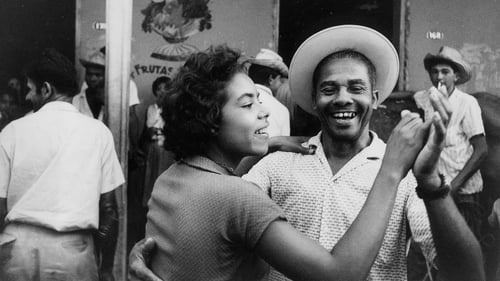Sara Gómez
Nacimiento : 1942-11-08, La Habana, Cuba
Muerte : 1974-06-02
Historia
Sara Gómez was a Cuban filmmaker, screenwriter, musician and journalist. She is recognized as the first Cuban woman to direct a fiction film: De cierto manera (1974).

Executive Producer
Año 1985. Óliver, un niño con una imaginación desbordante, se muda con su familia al rincón más al sur de Europa, justo cuando está a punto de pasar el Cometa Halley. Estos acontecimientos marcarán un antes y un después en la vida emocional de Óliver, que buscará en las estrellas la solución a sus problemas en el nuevo colegio, en el barrio y en casa. Para colmo, su abuelo, apodado “el majara” se anima ayudarle a interpretar el mensaje del cometa y dar un paso al frente en su nuevo Universo.

Writer
El reparto Miraflores, construido en 1962 por los mismos que lo habitarían, es resultado de los primeros esfuerzos de la Revolución por erradicar los barrios marginales. Yolanda, nueva maestra de la comunidad, afronta las diferencias y conflictos que surgen en su relación amorosa con Mario, un obrero de la barriada, en la que se manifiesta el choque entre la antigua mentalidad y las nuevas actitudes.

Director
El reparto Miraflores, construido en 1962 por los mismos que lo habitarían, es resultado de los primeros esfuerzos de la Revolución por erradicar los barrios marginales. Yolanda, nueva maestra de la comunidad, afronta las diferencias y conflictos que surgen en su relación amorosa con Mario, un obrero de la barriada, en la que se manifiesta el choque entre la antigua mentalidad y las nuevas actitudes.

Director
Opinions of workers of the textile industry on the theses of the XIII Labor Congress of the CTC.

Screenplay
Documentary about the history of the bateyes, informal settlements surrounding the mills to house workers. Throughout the film, Sara Gómez recovers the political and cultural relevance of black migrants.

Director
Documentary about the history of the bateyes, informal settlements surrounding the mills to house workers. Throughout the film, Sara Gómez recovers the political and cultural relevance of black migrants.

Director
About the election in assembly of the President of the Poder Popular (Popular Power)

Director
An illustration of the difficulties women encounter when they seek to achieve economic integration and equality with men in a country at the height of revolution.

Director
A short poetic evocation by Sara Gómez of Isla de Pinos, the island where Fidel Castro was imprisoned by Batista, where the revolution builds a new society. A juxtaposition of the Presidio Modelo prison with citrus production.

Director
Loose collection of individual portraits of the inhabitants of the Isle of Pinos [now Isla de la Juventud], who tell their stories, share ideas and discuss topics such as racism and crime.

Director
In this film, Sara Gómez documents the everyday life of the Isla de Pinos, the discussions about the problems of construction, the school and the leisure activities of the youth in 1968 and contextualizes these images with Frantz Fanon's thoughts about the construction of a nation through decolonization.

Writer
A documentary that gives a lyrical introduction to Afro-Cuban rhythms. The short features interviews, footage of impromptu street performances, and studio recordings.

Director
A documentary that gives a lyrical introduction to Afro-Cuban rhythms. The short features interviews, footage of impromptu street performances, and studio recordings.

Writer
A pioneer in the genre of autobiographical documentaries, this film made by the renowned Cuban director Sara Gómez explores her family roots to offer a family portrait through photos, popular music, and women’s tales. It is also a powerful document of an age and a way of living: that of middle- or upper-class black families in Cuba, meeting in exclusive bars just before the Cuban Revolution.

Director
A pioneer in the genre of autobiographical documentaries, this film made by the renowned Cuban director Sara Gómez explores her family roots to offer a family portrait through photos, popular music, and women’s tales. It is also a powerful document of an age and a way of living: that of middle- or upper-class black families in Cuba, meeting in exclusive bars just before the Cuban Revolution.

First Assistant Director
Versión de la novela Gobernadores del rocío del escritor haitiano Jacques Roumain. La historia se desarrolla en una aldea de Haití en los años 40. Cuando Manuel, joven haitiano, regresa a su país, tras pasar varios años en Cuba como cortador de caña, encuentra su comunidad sumida en una gran sequía que incide en la pobreza del lugar y la enemistad de dos familias por un asesinato pasado, impide hallar una solución al problema.

Writer
This black-and-white film is a loving portrait of Santiago de Cuba and its people. It provides a view of Cuba as a picturesque country, the product of an earthy mix of black and criollo cultures. The film uses historical images which portray the end of the eighteenth century when Haitian slave owners fled with their slaves to Cuba after the Haitian Revolution.

Director
This black-and-white film is a loving portrait of Santiago de Cuba and its people. It provides a view of Cuba as a picturesque country, the product of an earthy mix of black and criollo cultures. The film uses historical images which portray the end of the eighteenth century when Haitian slave owners fled with their slaves to Cuba after the Haitian Revolution.

Self (uncredited)
“Salut les Cubains” anima mil quinientas de las más de cuatro mil instantáneas que Varda tomó durante sus vacaciones en Cuba. Mediante el montaje, la realizadora consigue que las personas retratadas canten y bailen, en lo que ella denomina como "socialismo y cha cha cha". (FILMAFFINITY)

Director
Documentary short film that shows the manufacturing process of Cuban cigars.

Director




